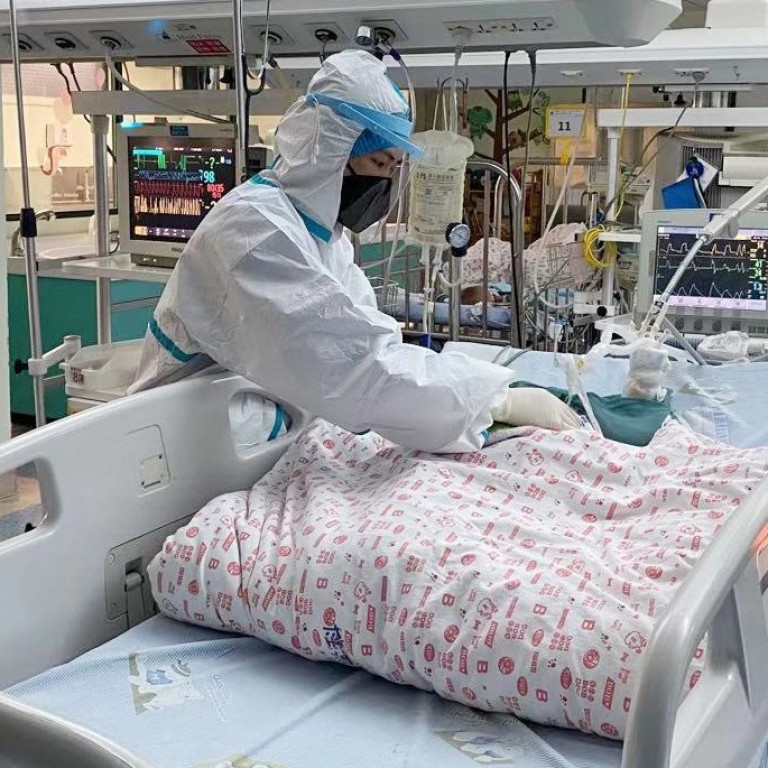
Coronavirus: Americans on WHO team to assess crisis, China says
- Experts to visit Beijing, Guangdong and Sichuan – but Hubei, where the virus originated, is not on the itinerary
- Specialists say the visit must include a trip to the outbreak’s epicentre in the province to get a full picture
The death toll from the coronavirus had risen to 1,770 on mainland China as of Sunday, with 70,548 people, including more than 1,700 medical workers, infected. Most of those confirmed with the disease, now known as Covid-19, are in Wuhan.
On Monday, the Ministry of Foreign Affairs said the WHO delegation would include Americans, but gave no further details.
The announcement came as a commentary in Communist Party mouthpiece People’s Daily accused Washington of dragging its feet on a funding pledge to help with the epidemic, saying it had a “dark mentality and taken dangerous action” during the outbreak.
WHO director general Tedros Adhanom Ghebreyesus said on Friday that the mission to China included 12 international medical specialists, and they would, with 12 Chinese experts, learn more about the transmission of the virus and the effectiveness of the measures in a bid to work out the next containment steps for China and the world.
An advance team of WHO medical experts arrived in Beijing last Monday, led by Canadian emergency expert Bruce Aylward, Tedros said.
China’s National Health Commission (NHC) said all of the delegation’s members arrived in Beijing over the weekend, and held talks with Chinese medical experts, public health officials and other government departments.
They exchanged views on virus containment, wildlife management and vaccine development, the NHC said.
The Global Times, a nationalist tabloid affiliated with Communist Party mouthpiece People’s Daily, quoted Xi Chen, an assistant professor of global health policy and economics at Yale University, as saying that Hubei was at a critical moment in its fight to stop the virus and might not have the capacity to work with the WHO mission right now.
Chen, who is also the head of the US-based research organisation the China Health Policy and Management Society, added that the inspection team might want to talk with Zhong Nanshan, one of China’s top respiratory disease experts and a senior government adviser, during the trip to Guangdong province.
Along with Beijing, the province has set the standard in the country in preventing epidemics, having improved the public health system in the aftermath of the severe acute respiratory syndrome outbreak in 2003.
Sichuan authorities also had links with public health experts in the US, and its governor had experience in public health, he said.
China to fast-track biosecurity law in coronavirus aftermath
Experts said the international team would be left with an “incomplete picture” of the outbreak if it did not go to Wuhan or Hubei.
“Unfortunately, this feeds into a narrative that China is trying to hide the true nature of the outbreak, so it would seem to be shortsighted and counterproductive to China’s efforts to say to the world that it is doing everything it can to contain this outbreak,” said Adam Kamradt-Scott, a specialist in global health security and international relations at the University of Sydney.
“We have seen in the past when we have external teams, they are often able to identify areas for improvement or to make recommendations for measures that national authorities may not have thought of – we’ve seen that through other examples where external expertise can be valuable in times of crisis.”
He said any impression of a cover-up would likely further strengthen the resolve of countries that had taken strict measures, including travel bans, to keep them in place or tighten them further.
“China has got a public relations campaign that it also needs to be mindful of in engaging with the international community, so there are the actual measures that the government needs to take in order to control the outbreak, but the government also needs to be seen to be doing everything that it can,” he said.
Purchase the China AI Report 2020 brought to you by SCMP Research and enjoy a 20% discount (original price US$400). This 60-page all new intelligence report gives you first-hand insights and analysis into the latest industry developments and intelligence about China AI. Get exclusive access to our webinars for continuous learning, and interact with China AI executives in live Q&A. Offer valid until 31 March 2020.


